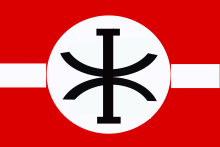Vlajka
- Vlajka means flag in Czech. You may be after the flag article, or the flag of the Czech Republic.

Český národně socialistický tábor — Vlajka (Czech National Socialist Camp — Vlajka) or simply Vlajka (in Czech The Flag) was the name of a small Czech fascist, antisemitic and nationalist movement, and its corresponding publication. The publication itself was founded in 1928, its first editor being Miloš Maixner. During the time of German occupation the organisation collaborated with the Nazis for which it was banned and its members were punished after the liberation.
History of Vlajka
The movement became politically active in the 1930s in the period of the Great depression, but never gained popularity as there were more established fascist parties in Czechoslovakia, such as the NOF, which even gained some seats in Parliament.
After the German occupation the organisation closely collaborated with the Nazi police institutions, such as the Gestapo and Sicherheitsdienst in order to eliminate communists, Jews and people closely connected with the previous Czechoslovak establishment. For that the organisation's existence was tolerated by Germans until 1942, even though there was only one officially permitted Czech political organisation, the National Partnership. The Vlajka became politically unacceptable after another traitor, Emanuel Moravec, was appointed the Minister of Education in the government of Protectorate in January 1942. He was often and openly criticized and fiercely denounced by Vlajka members for being a former legionary, an officer of the Czechoslovak Army and an alleged Free Mason. At the end of 1942, Vlajka was disbanded and some of its leaders, including Jan Rys-Rozsévač, were held in the Dachau concentration camp as privileged prisoners.
Though the party no longer existed, its former members continued to collaborate with the Gestapo and SD. Towards the end of the war they even formed the so called Voluntary Company of St. Wenceslaus, the only Waffen-SS unit composed of volunteers of Czech ethnicity (which nevertheless was never involved in the fight).
After the war, the leaders of Vlajka were subject to punishment of 5-20 years of imprisonment according to Beneš decree No. 16/1945 Coll.; mere membership was punishable by up to 1 year of imprisonment according to decree No. 138/1945 Coll. Four leaders of Vlajka and many other Vlajka members who caused the death of people through denunciation, were executed.
See also
- Viktor Dyk, romantic poet and Vlajka contributor
- František Mareš, philosophy professor
- Jan Rys-Rozsévač, leader of the group
- National Fascist Community, competing movement of Radola Gajda
Further reading
- Nakonečný, Milan (2001). Vlajka - K historii a ideologii českého nacionalismu. Praha: Chvojkovo nakladatelství. ISBN 80-86183-24-6.